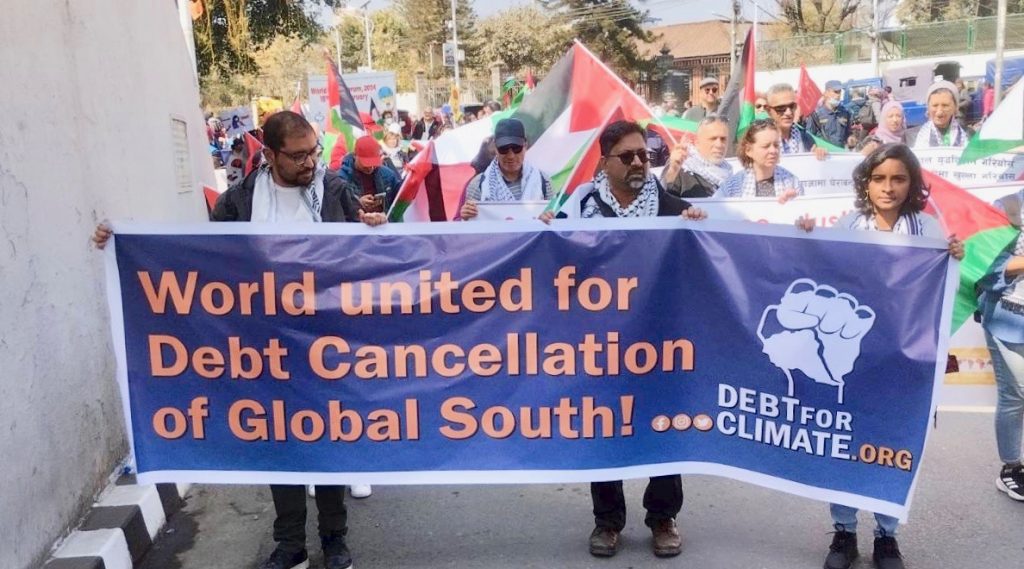Opinion: Canceling the Debts of Global South Nations: A Necessary Part of the Worldwide Climate Effort. Part 2

A march at the World Social Forum in Nepal in February 2024. Photo: courtesy of Debt for Climate.
Love, Justice, and Climate Change
Part 1 of this post appeared on March 5 and is available here. If you have not yet read Part 1, I encourage you to read it before reading Part 2.

Global North Should Be Paying the Global South
Actually, it is the Global North (GN) that should be repaying the Global South (GS). The countries of the GN have been stealing resources from the GS, or taking them while only paying a fraction of their cost, for centuries. The global systems of trade and finance are set up to extract profits from the Global South. Social scientists have found that the flow of resources and labor from the GS to the GN now equals $2.2 trillion per year. Furthermore, the damage to the agriculture, health, housing, infrastructure, etc. of the nations of the GS from climate change so far Is in the trillions of dollars and can be seen as part of the debt the GN owes the GS.
Debt Cancellation Is Not Rare
When the COVID crisis struck, the U.S. government loaned billions of dollars to small U.S businesses as part of a Paycheck Protection Program. Instead of requiring repayment of those debts, most of them — $755 billion of them– were canceled. In the last few years the Biden Administration has canceled $138 billion in student loan debt bringing relief to 3.9 million U.S. borrowers.
In 1953, creditor nations canceled 50% of all of the loans owed by the German government–loans from before, during, and after the war. Germany was given remarkably favorable terms for repaying the debt that remained. It was stretched out over 30 years, only needed to be paid when Germany ran a trade surplus, and payments were limited to 3% of export earnings. This was done because the western democracies wanted the German economy to succeed as a barrier to Soviet expansion. Isn’t it just as important to the whole world now that the economies of the developing and emerging nations thrive so they can take needed climate action?
Regular, periodic debt cancellation is called for in the Muslim, Jewish, and Christian traditions. In the Bible (Deuteronomy 15:1-2) it says “At the end of every 7 years you must cancel debts. This is how it is to be done: Every creditor shall cancel any loan they have made….” This was clearly intended to relieve poverty and give the indebted a fresh start on a regular basis. Catholic bishops and other faith leaders have recently called for debt cancellation, especially for Africa.
We could start by canceling GS debts to the World Bank and the IMF. This would make GS resources available for climate action and development, rather than debt service.
Getting Ready to Be Knowledgeable Advocates
Finance is expected to be a major focus of the next two UN climate conferences. Debt cancellation will be part of what is discussed. As far as I can tell, the climate movement in the United States is not well prepared to advocate for fair share climate finance and debt cancellation to benefit the Global South. This needs to change.
I think it will be key for all of us in the climate movement to become better informed about this issue and to insist that our climate organizations educate their members and take strong policy positions in favor of debt cancellation and fair share climate finance. We can each start now to learn more, share what we are learning, and advocate for “Debt Cancellation Now.”
[This is Part 2 of a 2-part post. If you would like to read, or share, both parts of the post together, the full text is available here ]
Russ Vernon-Jones was principal of Fort River School 1990-2008 and is currently a member of the Steering Committee of Climate Action Now-Western Massachusetts. He blogs regularly on climate justice at www.russvernonjones.org.
